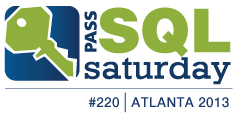SQL Saturday #220
Wow, SQL Saturday #220 in Atlanta, GA has 800 registered and over 20 on the waiting list! As usual, looking over the schedule I’m going to have to make some tough choices deciding which sessions to attend. What kind of choices? I’m glad you asked! (BTW, go to the schedule page for the full list of sessions. If I could, I would attend them all.)
Schedule Strategy
9:00 am
Right out of the gate, I’m torn between three main choices:
-
Dan Holmes’s The Last Mile: Dynamically Created Objects. I’m not exactly sure what “Dynamically Created Objects” means, but it sounds very interesting.
-
Melissa Coates’s So You Want To Be A Rockstar Report Developer?. Reports are the most visible deliverable of business intelligence work, and I’m sure I could learn some tricks from Melissa.
-
Mike Robbins’s PowerShell Fundamentals for Beginners. I’ll admit, I have avoided PowerShell for years. I have always done more development work than administration, so I haven’t had an urgent need to learn it. However, the more development work I do, the more I realize the need for administration skills. And if you want to work smarter, not harder, then PowerShell is the way to go. This session is tailor-made for me.
The verdict: This may be a coin-toss. Learn a new skill with PowerShell, extend my skills with SSRS, or learn an advanced technique with dynamically created objects? Argh! Undecided!
10:15 am
Things don’t get any easier in the next time slot. I’ve narrowed it down to three choices:
-
Adam Machanic’s 5 Query Plan Culprits That Cause 95% of Headaches. Adam is presenting the same session back-to-back, so make no mistake, I will attend one of his presentations.
-
Teo Lachev’s Best Practices for Implementing an Enterprise BI Solution. Teo needs no introduction to the Atlanta BI crowd. An hour of BI best practices from Teo would be well worth attending
-
Eddie Wuerch’s Page Latches for Mere Mortals. An opportunity to learn an advanced topic from an expert. For free? Yes, please.
The verdict: It probably depends on how crammed Adam’s room is. Apparently his session was the highest vote-getter in the session survey sent out by the event organizers. If I can’t grab a seat, I’ll head over to Teo or Eddie’s session and later catch Adam’s 2nd presentation.
1:00 pm
Right after lunch, I’ll have five(!) tough choices between some big names:
-
Adam Machanic’s re-presentation
-
Jason Thomas’s GeoSpatial Analytics Using Microsoft BI. This is an interesting topic that is relevant to so many types of data. Location, location, location!
-
Thomas LeBlanc’s Attributes & Hierarchies in Analysis Services 2012. This is a topic I am familiar with, but could always pick up something new.
-
Denny Cherry’s Storage for the DBA. A database can’t exist without storage. A true data professional needs to understand the pieces, even when it is someone else’s job. Not every company has the luxury of a dedicated storage administrator.
-
Kevin Kline’s Team Leadership Fundamentals. If you’ve ever attended one of Kevin’s sessions, you know he is top-notch. I have managed a team in past roles, and I quickly discovered it is a skill that must be sharpened, just like a technical skill.
The verdict: Attending Adam’s session if I missed the first one, otherwise, I am undecided. It’s a win, no matter the choice.
2:30 pm
Man, this time slot pits two BI languages head-to-head, both of which are relevant to me. It’s a DAX vs. MDX decision!
-
Javier Guillen’s DAX Formulas: Evaluation Context. I have only started learning DAX, but it is very high on my “Things to Learn” list. I know that evaluation context is an important concept to master DAX.
-
Justin Stephen’s BI - Practical Date Calculations. From the description: “Together, we will explore building MDX using Named Sets, Scope and This Functions, and an Enabler Dimension to provide this functionality”. I am currently using MDX, but have not yet used scope or an Enabler Dimension. I know a bit about scope, but am really intrigued by this Enabler Dimension concept.
The verdict: Sigh, man, I really want to attend both of these. MDX is more relevant to me currently, but DAX is new, and I need to learn it (and the BISM tabular model) sooner than later. I’m leaning towards the MDX presentation, but it’s a tough decision.
3:45 pm
As with every hour, there are lots of good choices, but for me, this was the easiest decision.
- Stacia Misner’s Troubleshooting MDX Query Performance.
The verdict: I have really been focusing in on MDX for the past several months, and want to continue building my knowledge. Performance tuning MDX is challenging, so I welcome the chance to learn from a respected industry veteran.
Conclusion
This year’s SQL Saturday Atlanta looks to be bigger and better than ever. It’s amazing how the community has grown year over year. A big thank you in advance to the event organizers, sponsors, and speakers for all your time, money, and attention. No matter what sessions I decide to attend, every choice is a win-win.
The schedule for SQL Saturday #220 has been released and as usual, I have some tough choices to make on conflicting sessions.



